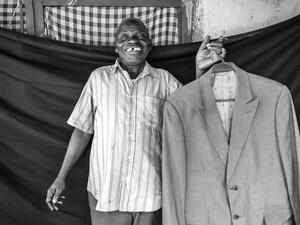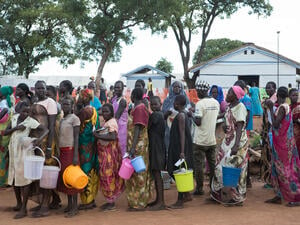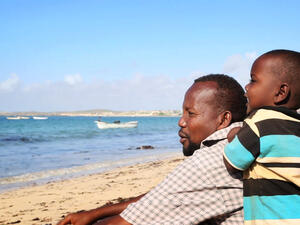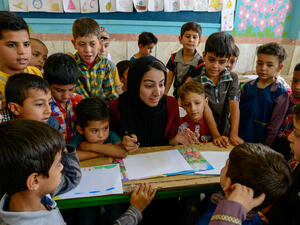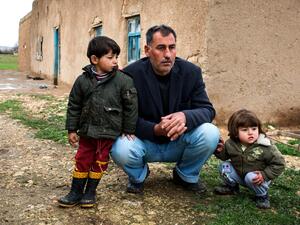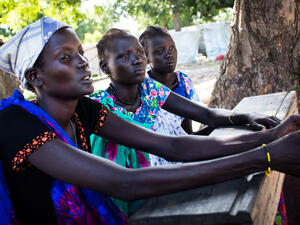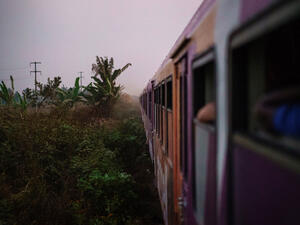The Dinka head home with up to 1.5 million cattle in epic trek across South Sudan
The Dinka head home with up to 1.5 million cattle in epic trek across South Sudan

SPLA soldiers escort one of the first groups of Dinka cattle through Juba, towards the one and only bridge over the White Nile.
JUBA, South Sudan, December 8 (UNHCR) - "I am here now because we have been attacked many times by other tribes. They stole our cattle, they stole our clothes - they even stole our kitchen utensils," said Dinka tribeswoman Tabita, shortly after she arrived in Lologo camp, 15 kilometres south-east of Juba, in South Sudan.
The Dinka had been involved in a series of clashes with members of another tribe in Mundri, Western Equatoria, where they have been living for the past 14 years. The other tribe accused the Dinka of allowing their cattle to encroach on its grazing land and destroy its crops. Several people from both sides were killed during the clashes, which finally led Tabita and 12,000 other Dinka to leave Mundri and head for home, despite the lack of resources awaiting them when they get there.
Along with thousands of others, Tabita originally left Bor, in the eastern part of south Sudan, in 1991. "At that time, the Sudanese People's Liberation Army (SPLA) split," she explained. "This resulted in a bloodbath for my people. We had to leave."
Tabita is now waiting with her three small children in Lologo, receiving food and basic health services from aid agencies, which have fanned out across South Sudan in preparation for the planned organized repatriation operation from neighbouring countries as well as from elsewhere inside Sudan.
Some time soon, she and her children will be transported by barge along White Nile River to Bor - a journey that will take up to two days. As of Thursday, UNHCR had registered 1,320 vulnerable Dinka - mostly women, children and elderly - in Lologo camp. Tabita's husband is travelling separately, accompanying their 20 cows alongside the other men and cattle herds slowly making their way across South Sudan. Like all pastoralist tribes in Africa, the family relies mainly on their cattle for their survival.
The Dinka began their epic trek back to Bor in September, escorting an estimated 500,000-1,500,000 cattle. The group is split into 34 huge loosely strung herds. The leading groups have started arriving in Juba over the past few days. In order to stop them congesting the busy new capital of South Sudan, the cattle herds and their owners are being escorted by SPLA soldiers through the outskirts of the city and over the bridge - the only one crossing the White Nile for a long way in either direction.
By Thursday, around 10,000 cattle were believed to have crossed the bridge. They are moving slowly and, as the herdsmen prod the cattle along with sticks, the thick clouds of dust gradually settle behind each sub-group of 80-100 cows.
For the time being, the herds are stopping on the other side of the bridge, waiting for more SPLA soldiers to secure the road connecting the two towns.
"Once this is done, the herds will start moving along the river bank in the direction of Bor," explained UNHCR Senior Protection Officer Terence Pike. The road between Juba and Bor is thought to be heavily mined as a result of the 21-year conflict in the south, and UN agencies are concerned that many cattle will be blown up. It is estimated that it will take them several weeks to reach Bor.
The end of the journey will not mean the end of their problems. "The absorption capacity for returnees is quite limited in Bor," said Pike. The city was severely destroyed during the war and basic services and accommodation are still very sparse. "But UNHCR is trying to identify relatives with whom the cattle herders can stay. This will of course ease their reintegration back into a location they left 14 years ago."
Some Dinka have also moved southwards in order to escape the tribal fighting in Western Equatoria. In Yei - a town close to the border with Uganda - UNHCR and the UN coordinating agency, OCHA, have registered more than 1,000 Dinka-Bor who have arrived from Mundri over the past three weeks. The agencies also report that several hundred Dinka have arrived from Yambio in recent days, fleeing fighting there as well.
"I arrived in Yei last Saturday with my eight children and my wife," said 40-year-old John. "Fighting started in the school in Yambio three weeks ago. It spread to the whole city."
UNHCR and other agencies had to relocate their staff following these incidents and are in the process of assessing the security situation before deciding whether or not to bring their teams back to Yambio. It is not only the Dinka-Bor who are being affected by the fighting in South Sudan. Their opponents are too: 3,000 people belonging to the Zande tribe have reportedly crossed over to the Democratic Republic of the Congo in the past month to escape the fighting between them and the Dinka in other parts of Western Equatoria.
"Most of the displaced Dinka who arrived from Mundri, as well as from Yambio, are vulnerable people: women who have lost their husbands to the war, children, and elderly," said John McKissick, a UNHCR protection officer based in Yei. Most of them stay with relatives in Yei. "We have started to register them and we will provide them with different items such as blankets, plastic sheeting, mosquito nets, jerry cans. We will also give them high energy biscuits. But ultimately, we hope to be able to transport them back to Bor as soon as January or February."
That is indeed what the Dinka want above all: to be back home.
"If I had a car, I would go back right away to Bor. I was born there, and being displaced continuously is not a life for us," said 37-year-old Necodemus.
The road between Yei and Juba is currently unsafe because of the risk of attacks by the Ugandan rebel force known as the Lord's Resistance Army. As a result, this group of displaced Dinka may have to be airlifted from Yei to Bor.
In all, there are believed to be around 4 million people from the south displaced inside Sudan as a result of two decades of conflict. There are also 500,000 southern Sudanese refugees in neighbouring countries, many of whom are expected to go home with the help of UNHCR over the coming months and years, as a result of the January 2005 peace agreement between the government and the SPLA.
By Hélène Caux in Juba and Yei, South Sudan


